This writer agreed with Harry Markopolos’s conclusion that “we shouldn’t trust the government.”
Writes Andrew Fitzgerald:
My wife had the Today Show on this morning to which I usually don’t pay any attention, but Matt Lauer was interviewing Harry Markopolos who I had seen interviewed before on Frontline. Markopolos was a competing trader tasked with figuring out Madoff’s secret to such great returns. He said that he conclusively determined his operation to be a fraud in 30 minutes and over the next several years informed the SEC four separate times. He said that the big problem with the SEC was that they’re staffed with lawyers who don’t know anything about money and investigating. I remember in the Frontline piece he said that it would have been easy enough for the SEC to contact every broker on the NYSE and find that none had ever placed a trade for Madoff.
The great parts of his interview this morning were when Lauer questioned him about his fears of being threatened by Madoff. Markopolos said that he bought a gun and if he were personally threatened by Madoff he planned to kill him since, “it was either him or me.” Lauer looks at him quizzically asking how he would explain that to law enforcement. Markopolos, who doesn’t exactly look like a Charles Bronson vigilante, said “well I’d hope not to get caught. I certainly had some good Army training, and it was really him or me. I had a family to protect. The government wasn’t protecting me; they were not doing their jobs, and I felt forced into a rather difficult moral dilemma.” Lauer ends the interview by asking him what lessons should investors learn from this mess. He answers, “don’t trust your government.”
I felt the whole interview had a great libertarian ring to it, with our government budget going to no good purpose except possibly training a would-be vigilante and the regulatory agency being warned repeatedly about the greatest private fraud in American history to no effect. Source: http://www.lewrockwell.com/blog/lewrw/archives/52150.html
You can see Harry Markopolos interviewed on this 8 minute segment from yesterday’s Today Show.
Harry Markopolos on investigating one of the biggest frauds in history
TODAY books, updated 7:01 a.m. PT, Mon., March. 1, 2010
Harry Markopolos is the whistle-blower who uncovered Bernie Madoff’s Ponzi scheme 10 years before the rest of the world learned of the biggest financial crime in history. While a lot has been written about Madoff’s scam, few actually know the dramatic details of how Markopolos and a small group of sleuths went about investigating the fraud that reached around the globe. In “No One Would Listen,” Markopolos shares his story. An excerpt.
On the morning of December 11, 2008, a New York real estate developer on a JetBlue flight from New York to Los Angeles was watching CNBC on the small seat-back television. A crawl across the bottom of the screen reported that Bernard Madoff, a legendary Wall Street figure and the former chairman of NASDAQ had been arrested for running the largest Ponzi scheme in history. The developer sat silently for several seconds, absorbing that news. No, that couldn’t be right, he thought, but the message streamed across the screen again. Turning to his wife, he said that he knew that she wasn’t going to believe what he was about to tell her, but apparently Bernie Madoff was a crook and the millions of dollars that they had invested with him were lost. He was right — she didn’t believe him. Instead, she waved off the thought. “That’s not possible,” she said, and returned to the magazine she was reading.
The stunned developer stood up and walked to the rear of the plane, where the flight attendants had gathered in the galley. “Excuse me,” he said politely, “but I’m going to be leaving now. So would you please open the door for me? And don’t worry — I won’t need a parachute.”
At about 5:15 that December afternoon, I was at the local dojo in my small New England town watching my five-year-old twin boys trying to master the basic movements of karate. It had been a gloomy day. Rain continued intermittently, and there was a storm in the air. I noticed there were several voice mails on my cell phone. That’s curious, I thought; I hadn’t felt it vibrate. I stepped into the foyer to retrieve the messages. The first one was from a good friend named Dave Henry, who was managing a considerable amount of money as chief investment officer of DKH Investments in Boston. “Harry,” his message said clearly, “Madoff is in federal custody for running a Ponzi scheme. He’s under arrest in New York. Call me.” My heart started racing. The second message was also from a close friend, Andre Mehta, a super-quant who is a managing director of alternative investments at Cambridge Associates, a consultant to pension plans and endowments. I could hear the excitement in Andre’s voice as he said, “You were right. The news is hitting. Madoff’s under arrest. It looks like he was running a huge Ponzi scheme. It’s all over Bloomberg. Call me and I’ll read it to you. Congratulations.”
I was staggered. For several years I’d been living under a death sentence, terrified that my pursuit of Madoff would put my family and me in jeopardy. Billions of dollars were at stake, and apparently some of that money belonged to the Russian mafia and the drug cartels — people who would kill to protect their investments. And I knew all about Peter Scannell, a Boston whistleblower who had been beaten nearly to death with a brick simply for complaining about a million-dollar market-timing scam. So I wouldn’t start my car without first checking under the chassis and in the wheel wells. At night I walked away from shadows and I slept with a loaded gun nearby; and suddenly, instantly and unexpectedly, it was over. Finally, it was over. They’d gotten Madoff. I raised my fist high in the air and screamed to myself, “Yes!” My family was safe. Then I collapsed over a wooden railing. I had to grab hold of it to prevent myself from falling. I could barely breathe. In less time than the snap of my fingers I had gone from being supercharged with energy to being completely drained.
The first thing I wanted to do was return those calls. I needed to know every detail. It was only when I tried to punch in the numbers that I discovered how badly my hand was shaking. I called Dave back and he told me that the media was reporting that Bernie Madoff had confessed to his two sons that his multibillion-dollar investment firm was a complete fraud. There were no investments, he had told them; there never had been. Instead, for more than two decades, he had been running the largest Ponzi scheme in history. His sons had immediately informed the Federal Bureau of Investigation (FBI), and agents had shown up at Madoff’s apartment early that morning and arrested him. They’d taken him out in handcuffs. It looked like many thousands of people had lost billions of dollars.
It was exactly as I had warned the government of the United States approximately $55 billion earlier. And as I stood in the lobby of that dojo, my sense of relief was replaced by a new concern. The piles of documents I had in my possession would destroy reputations, end careers, and perhaps even bring down the entire Securities and Exchange Commission (SEC), the government’s Wall Street watchdog — unless, of course, the government got to those documents before I could get them published. I grabbed my kids and raced home.
My name is Harry Markopolos. It’s Greek. I’m a Chartered Financial Analyst and Certified Fraud Examiner, which makes me a proud Greek geek. And this, then, is the complete story of how my team failed to stop the greatest financial crime in history, Bernie Madoff’s Ponzi scheme. For the previous nine years I had been working secretly with three highly motivated men who worked in various positions in the financial industry to bring the Bernie Madoff fraud to the attention of the SEC. We had invested countless hours and risked our lives, and had saved no one — although eventually, after Madoff’s collapse, we would succeed in exposing the SEC as one of this nation’s most incompetent financial regulators.
For example, it was well known that Madoff operated his legitimate broker-dealer business on the 18th and 19th floors of the Lipstick Building on New York’s East Side. But what was not generally known was that his money management company, the fraud, was located on the 17th floor of that building. Months after Madoff’s collapse, the FBI would reveal to my team that based on our 2005 submission providing evidence that Madoff was running a Ponzi scheme, the SEC finally launched an investigation — but that its crack investigative team during the two-year-long investigation “never even figured out there was a 17th floor.” I had provided all the evidence they needed to close down Madoff — and they couldn’t find an entire floor. Instead they issued three technical deficiency notices of minor violations to Madoff’s broker-dealer arm. Now, that really is setting a pretty low bar for other government agencies to beat. But sadly, all of this nation’s financial regulators — the Federal Reserve Bank, the Federal Deposit Insurance Corporation, the Office of the Comptroller of the Currency, and the Office of Thrift Supervision — are at best incompetent and at worst captive to the companies they are supposed to regulate. As I would later testify before Congress, “The SEC roars like a mouse and bites like a flea.” In retrospect, considering how much I have learned since then, and how much my team has learned, that probably was inaccurate: I was being too kind. Tens of thousands of lives have been changed forever because of the SEC’s failure. Countless people who relied on that agency for the promised protection have lost more than can ever be recovered. In some cases people lost everything they owned. And truthfully, the SEC didn’t even need to conduct an extensive investigation. My team had given them everything they needed. With the materials we submitted, it would have taken investigators no more than the time it took to ask Madoff three questions for his fraud to be discovered and his operation to be shut down. The magnitude of this Ponzi scheme is matched only by the willful blindness of the SEC to investigate Madoff.
Excerpted from “No One Would Listen,” by Harry Markopolos. Copyright (c) 2010, reprinted with permission from Wiley.
Source: http://today.msnbc.msn.com/id/35606057/ns/today-today_books/
Conclusions? Yes, you need to follow your compliance departments directives. No, your clients should not trust the government to protect their interests. And if any investment seems too good to be true, it probably is and you shouldn’t invest your clients money in it.
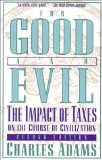
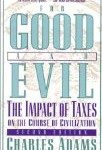 Today being March 15th, let’s celebrate “Tax Day” for corporations in America by taking a look at a wonderful book on the impact of taxation on throughout recorded history.
Today being March 15th, let’s celebrate “Tax Day” for corporations in America by taking a look at a wonderful book on the impact of taxation on throughout recorded history.
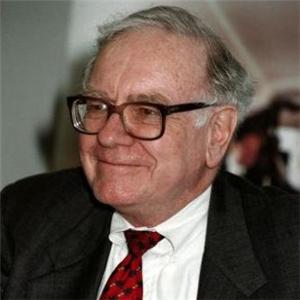
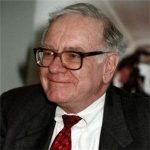
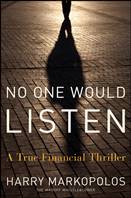
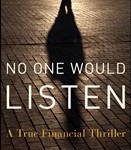


![[TAXREPORT]](https://sg.wsj.net/public/resources/images/MI-BB432_TAXREP_NS_20100212213220.gif)